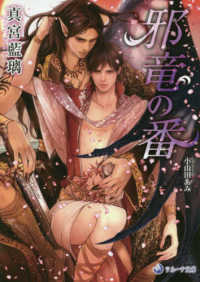- ホーム
- > 洋書
- > 英文書
- > Literary Criticism
Full Description
Drawing on early modern French thought to free nature and aesthetics from metaphysical humanism What good is aesthetics in an age of ecological crisis? Toward a Premodern Posthumanism: Anarchic Ontologies of Earthly Life in Early Modern France draws on deconstructive, ecological, and biopolitical theories to interrogate the potentiality that philosophical aesthetics contains for challenging the ontological capture of "nature" by the human subject. Chad CÓrdova uncovers in aesthetics something irreducible to the subject: an account of how beings emerge and are interrelated, responsive, and even response-able without reason.
Constructing multitemporal constellations of texts that bring forth the untimely relevance of pre-1800 modes of writing, science, and art, CÓrdova charts a new, premodern trajectory of posthumanism. This anarchic and atelic ontology, recovered from Kant, becomes the guiding thread for a new trajectory of posthumanist thought. This capacious study traces this trajectory from Aristotle to Heidegger and on to contemporary plant-thinking, circling back through Montaigne, Pascal, Diderot, Rousseau, and others along the way. This is a defense and an illustration of the importance of rereading early modern texts as a means of rethinking nature, art, and humanity in a time when these concepts are in flux and more contentious than ever.
Contents
Acknowledgments
Preface: Aesthetics and Ecological Ethics
Introduction: Toward a Posthumanist Aesthetics
Chapter 1. Drawing Beyond Disegno: Of Montaigne and Leonardo
Chapter 2. Anarchic Phusis: The Spontaneous Generation of Political Bodies
Chapter 3. Grace and Beauty: The Mystical-Erotic Genesis of Aesthetics
Chapter 4. The Natural-Historical Sublime: Diderot and the Ends of Landscape
Chapter 5. Being Per Accidens: Rousseau, Before-Beyond "Human Ends"
Coda: Mycorrhizal-Thinking: Post-Metaphysics and the Lessons of Vegetal Beings
Notes
Bibliography
Index






